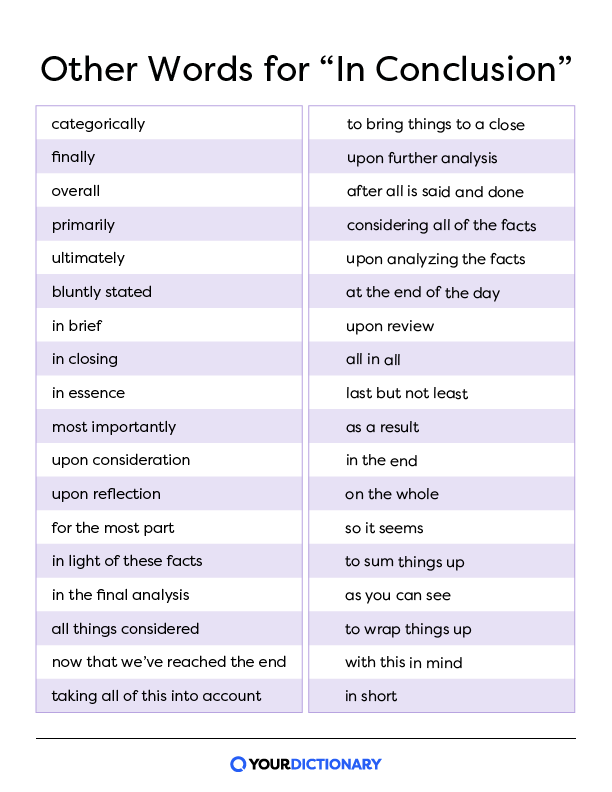Are you tired of ending your essays and presentations with the same old, predictable phrase? The words you choose to conclude can significantly impact the lasting impression you leave on your audience, transforming a mundane ending into a memorable crescendo.
The art of concluding effectively is often underestimated. While the classic "in conclusion" serves its purpose, it can quickly become a tired trope, signaling a lack of originality and potentially diminishing the impact of your carefully crafted arguments. A well-chosen alternative not only revitalizes your writing but also demonstrates a command of language, engaging your audience and reinforcing your core message in a fresh and compelling way.
Let's delve into the world of concluding phrases, exploring alternatives that range from formal and professional to informal and conversational. We'll examine the nuances of each, understanding when and how to deploy them for maximum effect. Remember, the goal is not just to signal the end, but to ensure your final words resonate, leaving a lasting impression that encourages reflection and, perhaps, inspires action.
- Why Skymovieshdorg Is A Mustvisit For Movie Buffs
- Bollyflex Com Movie Download Your Ultimate Guide To Bollywood Movie Downloads
One of the most crucial aspects of a strong conclusion is its ability to summarize the main points and provide a final, cohesive overview of the discussion. This reinforces the key takeaways, solidifying your argument in the reader's or listener's mind. It's your last chance to reiterate the significance of your work, ensuring that your audience grasps the essence of your message. Beyond summary, a good conclusion can also serve as a call to action, inspiring further engagement with the subject matter or motivating the audience to adopt a specific viewpoint or course of action.
Here's a table illustrating the career and professional information of a sample subject, which can be replaced with information about any person or topic:
| Category | Details |
|---|---|
| Full Name | Jane Doe |
| Date of Birth | January 1, 1980 |
| Place of Birth | New York, NY, USA |
| Education | Ph.D. in Literature, Harvard University (2008) |
| Career | Professor of English Literature at Yale University (2010-present) |
| Specialization | 19th-Century British Novels and Feminist Literary Theory |
| Publications | "The Role of Women in Dickens' Novels" (2012), "Feminist Readings of Jane Austen" (2018) |
| Awards & Honors | National Book Award Finalist (2019), Guggenheim Fellowship (2015) |
| Professional Affiliations | Modern Language Association (MLA), Women's Caucus for Political Science |
| Areas of Expertise | Literary Criticism, Gender Studies, Victorian Literature |
| Website (Reference) | Example Website |
Now, let's explore the various alternatives to "in conclusion." Think of these phrases as tools in your writing toolbox, each suited for a different task. Understanding their individual strengths and appropriate contexts is crucial to deploying them effectively.
- Ultimate Guide To Ullu Web Series List Your Onestop Destination For Edgy Entertainment
- Xxcxx 2022 Commonwealth Games The Ultimate Showdown That Left Everyone Speechless
Formal alternatives offer a professional tone suitable for academic papers, business reports, and other contexts where precision and clarity are paramount. "In summary" is a direct and effective option, ideal for summarizing the main points of your argument. "To summarize" serves a similar function, providing a clear signal that you are about to present a concise overview. "In closing" provides a graceful and sophisticated way to end, particularly suitable for formal presentations or written communications. These phrases are particularly useful when you need to make your final statement clear and concise.
Informal phrases, on the other hand, can add a touch of personality and approachability to your writing or speaking. "In a nutshell" is a classic, offering a quick and memorable way to encapsulate your key message. "Ultimately" implies the final, most important point or result, emphasizing the significance of your conclusions. Phrases like "at the end of the day" provide a more conversational, down-to-earth tone. "To sum up" also conveys the concise recap of the whole discussion.
Beyond these, there are a plethora of other alternatives, each with its unique flavor. "In brief" provides a concise summary. "To conclude" is a perfectly acceptable synonym for "in conclusion" but can often be replaced with more evocative language. "As has been noted" subtly refers back to your previous discussion, implying that your conclusions are based on the evidence presented. "Therefore" and "thus" directly connect the preceding arguments to the conclusion, highlighting the logical flow of your reasoning. "Finally," offers a straightforward way to indicate the end of your thoughts.
The choice of phrase will depend on the tone and context of your writing. A research paper might benefit from "in summary" or "to conclude," while an informal email might be better suited to "in a nutshell" or "at the end of the day." Always aim for a phrase that is both appropriate and engaging.
It's crucial to remember that a strong conclusion does more than simply restate your thesis. It offers an opportunity to add depth, nuance, and final insights. Consider leaving your readers with a thought-provoking question, a call to action, or a memorable quote. The goal is to create a lasting impression, one that encourages further reflection and engagement with your ideas.
One key to avoiding the overuse of "in conclusion" and similar phrases is to vary your approach. Mix and match different concluding styles and use your creative freedom to create fresh and unique endings to your essays. Experiment with different tones, from the formal to the informal. This will help you create a writing style that is both engaging and memorable.
The habit of using "in conclusion" frequently often stems from an ingrained belief that it is the only acceptable way to end an essay. Breaking this habit is a matter of conscious effort and experimentation. Start by listing all the alternatives you can think of, and then begin incorporating them into your writing. You might be surprised at how many options are at your disposal.
It's helpful to understand the role of conclusion as a reflection of the entire essay. Just like the beginning, the conclusion of your work should be carefully crafted. It has the power to shape the way your audience perceives everything they've read. The final words often linger in the mind long after the essay is finished, so make sure they reflect the thought and quality you have used in writing the complete article.
The ultimate goal is to master the art of concluding effectively. With practice, you can elevate your writing and speaking skills, crafting endings that are both impactful and memorable. By thoughtfully selecting your concluding phrases, you can ensure that your final words resonate with your audience, leaving a lasting impression and achieving your communication goals.
In the world of effective writing, finding the perfect way to conclude an essay or presentation is essential. This is more than just finding a replacement for "in conclusion"; it is about creating the perfect finish to your work that can capture and maintain your readers' attention.
Many writers and speakers feel that it's imperative to avoid phrases like "in conclusion," which can be considered predictable and even amateurish. It is believed that these types of phrases can make your writing feel less unique and engaging. Instead of relying on the standard, a variety of techniques can transform your conclusions into something that not only summarizes your main points but also strengthens your impact and leaves a lasting effect on your readers.
The phrases and techniques discussed so far act as your writing toolbox. Choosing the appropriate phrase depends greatly on the particular audience and context of your essay. Understanding the strengths of each term lets you tailor your ending to suit any situation, improving the efficacy of your writing and delivering your message clearly and in an inspiring manner.
By exploring creative ways to end your essays, you allow yourself to stand out and to craft a finish that is as unique and attention-grabbing as the rest of your article. Be creative and strive to deliver a fresh, tailored message with every piece of writing. This will not only improve your writing skills but also allow you to leave a memorable, impactful impression.
A good conclusion can make or break your paper. Your conclusion is your last chance to summarize your main points and really drive them home, so they stay fresh in your reader or listeners minds.
Heres another table of relevant information, in case you were looking for some, that we can use here.
| Aspect | Details |
|---|---|
| Purpose | Summarize main points, reinforce the argument, and offer a final perspective. |
| Key Actions | Summarize main ideas, restate the thesis (in new words), offer a final thought, and explain the significance of the argument. |
| Engagement Techniques | Use a compelling statement, pose a thought-provoking question, call the reader to action, or offer a relevant quote. |
| Tone Considerations | Match the overall tone of the paper; formal or informal as needed. |
| Common Pitfalls | Repeating the introduction, introducing new information, or apologizing for the argument. |
The avoidance of the tired "in conclusion" is a first step to a more sophisticated and engaging approach to writing and public speaking. By choosing a variety of synonyms, youre signaling to your audience that you are conscious of your words and that you are well-versed in the art of crafting effective and engaging communication. This is a critical step in leaving a lasting impression.
Remember, the ultimate goal of a conclusion is to create a lasting impression, inspire further thought, and drive home the importance of your message. Therefore, use the words in this guide to carefully craft a fitting conclusion that leaves a lasting impression.
- Bollyflix Com The Ultimate Destination For Bollywood Enthusiasts
- 9vids The Ultimate Platform For Your Daily Dose Of Entertainment


